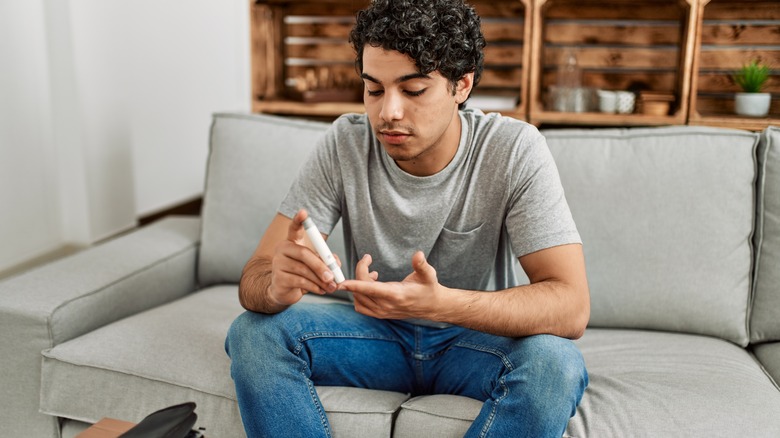How To Manage Hypoglycemia If You Have Type 2 Diabetes
Type 2 diabetes is a chronic condition characterized by insulin resistance. It is the most common form of diabetes, accounting for approximately 90% of all diabetes cases, per the International Diabetes Federation. For some people with type 2 diabetes, the pancreas doesn't produce enough insulin, a hormone that helps regulate blood sugar levels — for other people, the body becomes resistant to the effects of insulin. This results in high blood sugar levels, which can lead to a range of health problems if left untreated.
Symptoms of type 2 diabetes may include excessive thirst, unexplained weight loss, tiredness, blurry vision, slow-healing wounds, frequent urination, and numbness in the hands or feet. Treatment for type 2 diabetes typically involves a combination of lifestyle changes and medications, including insulin. However, in some cases, taking too much insulin can trigger conditions like hypoglycemia, which can come with its own set of issues if it's not addressed.
What is hypoglycemia?
Hypoglycemia can occur in people with diabetes who take certain medications, such as insulin. It is naturally produced in the pancreas and helps blood sugar enter cells for energy consumption. Lower-than-normal blood sugar levels characterize hypoglycemia — typically around 70 milligrams per deciliter (mg/dL) or lower.
Hypoglycemia can also occur in people who do not have diabetes, but it is usually due to certain medications. Common symptoms of hypoglycemia include shakiness, sweating, confusion, dizziness, headache, blurred vision, and fatigue. Acting quickly to raise your blood sugar levels is important when these symptoms are present. Without treatment, hypoglycemia can lead to serious health complications, such as seizures, loss of consciousness, and even death. Generally speaking, it's vital for people with diabetes to take steps to prevent hypoglycemia. If you experience frequent episodes of hypoglycemia, it's best to consult with your doctor who can advise you on the best way forward.
How to manage hypoglycemia with type 2 diabetes?
Regularly monitoring your blood sugar levels can help you detect hypoglycemia early and take steps to prevent it from getting worse. Your doctor might recommend testing your blood sugar at different times of day to better understand your blood sugar patterns. They might also recommend a target range for your blood sugar levels, which you must stick to in order to prevent the condition. If you're still having frequent episodes of hypoglycemia, your doctor may adjust your medication regimen and suggest changes to your diet or exercise routine.
WebMD advises eating three evenly spaced meals daily, ensuring that your meals aren't beyond 5 hours apart. Your doctor or a registered dietitian can help you develop a meal plan that suits your eating schedule. WebMD also advises exercising 30 minutes to 1 hour after a meal. However, your doctor may recommend an exercise regimen that is more suitable to your personal schedule.



